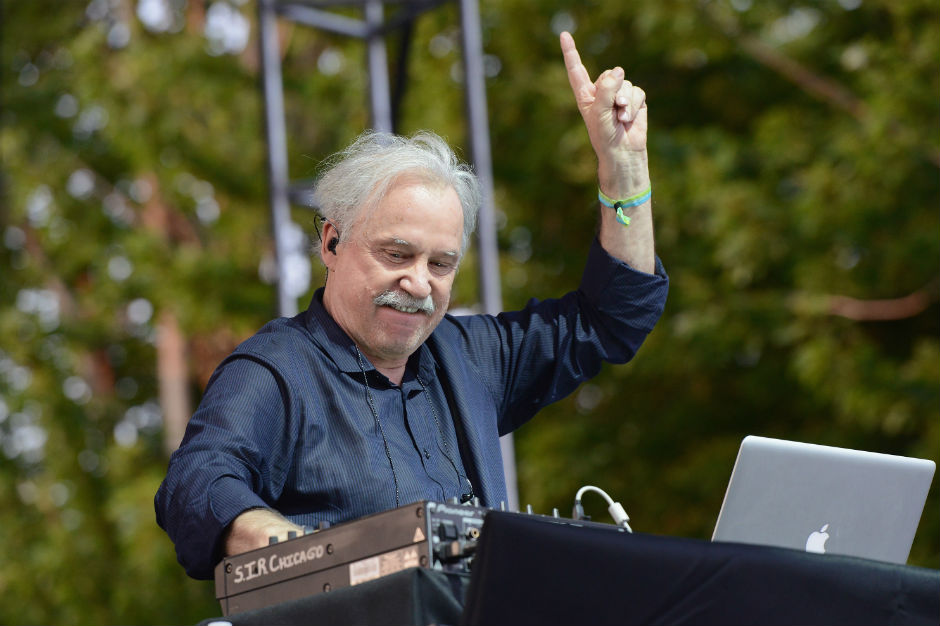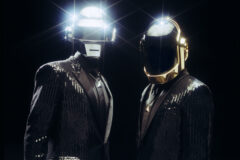You won’t meet a lot of 74-year-old musical innovators friendlier than Giorgio Moroder. Despite maintaining a distant persona during his heyday as the disco genius behind the dark sunglasses and thick ’70s mustache who only ever sang under heavily vocodered influence, Giorgio is disarmingly warm, talkative, and not the slightest bit jaded as he enthusiastically discusses the making of his first solo album since 1985, the upcoming Déjà Vu.
The combination of his enduring brilliance — he was responsible for co-writing and producing light-years-ahead smashes for Blondie, Berlin, and of course, musical soulmate Donna Summer — and his immense amiability likely facilitated the numerous high-profile collaborations with younger artists featured on his new full-length. (A spotlight appearance on robo-protégés Daft Punk’s Grammy-winning Random Access Memories LP also helped.) Charli XCX, Sia, Kylie Minogue, and Britney Spears all lend their vocals to the project, saving the producer from having to step to the mic himself — an assist for which he is exceedingly grateful. “My voice is not exactly the best, so I had Donna Summer to sing,” he explains of his older days. “I’m not going to start singing [again],” he promises — though he will allow for “a little vocoder.”
A few months ago, SPIN spoke with Giorgio about his long-overdue return to the spotlight — or at least, the spot next to the spotlight — as well as his positive feelings about the current state of dance music, and his insistence on Déjà Vu that 74 is, in fact, the new 24.
Who came up with the “74 Is the New 24” title?
Myself. I was DJing — I think about a year and a half ago, and there were something like 30,000 people. Actually, it was in Chicago. And all the kids, all were 18, 20, up to 30. So I kind of had a… I think I had a connection [with them], so I felt like 24.
Is it important for you to feel like you’re representing for the 70-somethings out there?
No, no.
You just feel 24 again?
Yeah — not physically, certainly not, but mentally, yes.
Does that have to do with the fact that popular music is vibing more with electronic music now?
Well, first, I like what’s happening now. I like the music, I like the sounds. Whatever is kind of the new EDM I like. I like that kind of music and I feel it.
And you kind of felt a displacement in the ‘90s and ‘00s, when hip-hop was more dominant?
You know, it’s like the grass of the neighbor is always greener. I studied two years of art, and so I said, “Okay, with music I should do art.” So I came to New York, started to work here on some neon work and then I did a short movie with pictures, so all sorts of kind of artistic stuff. And then I did some computer-generated images, and a lot of golf, and I had a nice life actually.
When you weren’t recording as much was it important to keep up with what was going on in popular music?
No, I was not. Of course I knew the hip-hop and all that, but I wasn’t listening to radio everyday. But obviously later on, when I started to DJ, you have to know what was going on, you have to know what the other DJs play, so I got back into listening to music and that’s what I do. I follow quite nicely what’s happening.
Is it more important to you to follow what’s popular on the radio, or what’s popular in the clubs, or what’s popular in the underground?
Well, mostly radio. Let’s say the top hundred, Billboard Top 100 or U.K. Top 100. I follow mostly those two.
Do you still go to clubs when you’re not DJing?
Me? To dance?
Well, 74 is the new 24, right?
No, there I’m 74. [Laughs.]
How did you come up with the list of collaborators for the album?
It’s between the record company, between myself, between my management — the creative hub of the management. They did a list, and said, “Okay, Are you interested? Could it work?” With some it worked, with some it didn’t.
And so the people you ended up working with, were they hand-selected by you from this list? And you were a fan of their music?
Oh, absolutely. Sia, that was one of the songs — ”Titanium” — which I loved even before knowing who she was. So she was on my list. Britney Spears was actually not on my list, because I never thought she would be interested, but then she asked the record company — she had this remake of an older song, and if I was interested in producing it, and that was great.
Did you meet your collaborators in the studio or did you have a remote connection?
I met some of them in the studio. I didn’t meet Sia — nobody meets Sia. I gave her the tracks with some melodies built in, and she recorded it by herself — with her people — and she gave me the final tracks, mixed, text, melody and everything.
So did you work with Charli?
No. I worked with very few. With Kylie, some of the stuff was done in London and then finished in Los Angeles, and then we did a video there.
Have you been surprised by the number of younger of artists that are excited to work with you?
Yeah. In fact, the idea was to have some established singers and some young singers — and not big stars — like Mikky Ekko, and Charli. Well, Charli was quite known already, but not as an artist, more of a composer. She’s become so big. And then a great guy, he has a hit with Tiësto — Matthew Koma. What a great guy. Talented.
So when you talk to these younger artists and they talk about your work, is there something that they most frequently cite as being an influence on them?
Mostly the song “I Feel Love.” You know, electronic with the arpeggios and all of that. That’s what mostly sell.
Did you feel, when you came up with the song, that it would still be cited as an influence 40 years later?
No. The idea was, how could I compose and produce a song that could be called the sound of the future. That was just a saying.
But it was right, it was the sound of the future.
It was right. And then Brian Eno came in and said I found the sound of the future, and he gave it kind of the quality stamp.
Was it hard for you to get back in the swing of recording since it’s been so long since your last solo album?
No. I always had a studio at home — very small, Pro Tools and a keyboard. So from time to time I would work a little bit, and then for two months I wouldn’t switch it on. So basically I know the program quite well, but I didn’t seriously work for quite a long time.
Do you enjoy working more with the newer technology? Does it make you more productive that you can work on stuff so quickly, or does it feel less organic?
Well, first of all, I don’t think it’s quick. It takes so long right now. Thirty years ago, I had my four or five musicians, and the track was done in an hour and a half, two hours. And that was it, we could barely change. Now you have tracks, and, “Oh no, the bass drum is not good,” and you come up with a list of a thousand bass drums. And it’s quite complicated right now. Certain sounds, especially the drums, they get old after six months. You have the latest, and then it’s, “Oh, no, no, that’s old.”
Do you have a favorite of your older solo albums?
Probably From Here to Eternity. That was nice. I still like it now. Usually I hate everything. [Laughs.]
Was it important to you back in the ‘70s to establish yourself as a solo artist?
Yeah, it was, but I never really pursued it, because I never had a great voice. I did not really want to perform live. At that time, there was no collaborations with other singers. Now, I think that instead of doing From Here To Eternity, all the songs, with myself as a singer, I could have had singers to join. But at that time it didn’t exist, or at least I didn’t know.
But your heavily vocodered voice became iconic in its own way.
Yeah, but after E=MC2 I didn’t do anything really. So I wasn’t convinced that I could become an artist. Plus, to perform live… I was always afraid of not remembering the lyrics. That was always my thing.
But you did have a Top 40 hit of your own, with “Chase.” How did that feel compared to some of your other chart toppers with people like Donna Summer?
That was quite nice, actually, because it was without a singer.
Would you be doing this album if synths didn’t come back in vogue and you didn’t have the success with the Daft Punk album?
I don’t think I would have ever made this album. Although I must say, when I started to DJ before the Daft, I got an offer for an album. But I was not convinced, and second, I didn’t like the guy who was involved, so I said no. But then five, six months later the Daft Punk came out, and then I got some of the offers for the album.
In an old interview with SPIN you said that the way you know something works is if it sells. Do you still feel that way? Is that how you’ll measure the success of this album?
Well, yeah. It’s maybe a little silly, but a good song is a good song if it sells. Not necessarily a big hit, but somehow. I had so many “good” songs which didn’t sell. And nobody knows about the songs, so obviously they were not good songs.
What drives you to still want to have solo success? You’re already incredibly established. Is it for fun?
The fact that at my age I still get the chance, it’s like, who am I to say no? Especially if you think that there are hundreds and hundreds of young people who are great, good looking, good singers, and young, and the record company’s investing money in me. Sometimes I don’t understand it, but I like it. That’s why I’m back.





